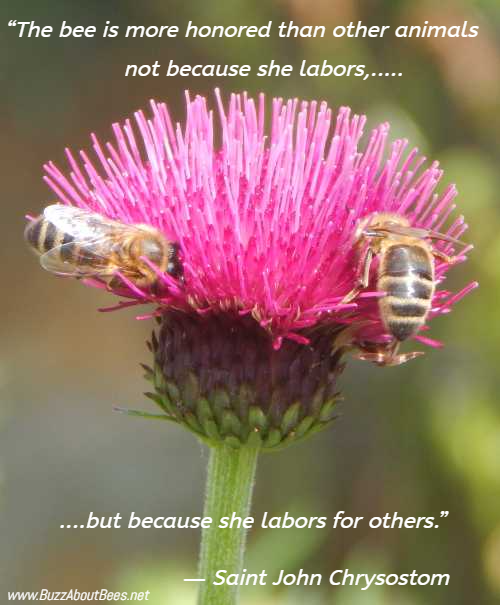These creatures are not only a significant part of the natural world, but are connected to the divine, too.
St. John Chrysostom explains the appreciation for the bee in one of his homilies; “The bee is more honored than other animals, not because it labors, but because it labors for others.” The bee is seen as a virtuous animal and a model for the Christian life.
Honeybees are an integral part of our natural world. They pollinate the majority of our crops and trees, giving us the food we eat and the air we breathe. But bees also hold a spiritual significance for humanity.
The very work that bees do – pollinating the land and helping the plants and crops grow – has been compared to holy work. A Byzantine farming book from the 10-century called Geoponika shows us the importance of bees: “The bee is the wisest and cleverest of all animals and the closest to man in intelligence; its works is truly divine and of the greatest use to mankind.”
Honey is referenced in the Bible over 60 times and is usually synonymous with purity and abundance. Exodus 3:17 describes the Promised Land for the Israelites as “a land flowing with milk and honey.” Proverbs 24:13 states “Eat honey, my son, for it is good; honey from the comb is sweet to your taste.” And in the Gospel of Luke, when Jesus appears to his disciples after the Resurrection, they give him a piece of fish and a honeycomb to eat.
Feast on this:
Psalm 19:10
More to be desired are they than gold, yea, than much fine gold: sweeter also than honey and the honeycomb.
Psalm 119:103
How sweet are your words to my taste, sweeter than honey to my mouth!
Proverbs 5:3
For the lips of a strange woman drop as an honeycomb, and her mouth is smoother than oil:
Proverbs 16:24
Pleasant words are as an honeycomb, sweet to the soul, and health to the bones.

Bee-True 2 U!
www.honeybeehive.us

